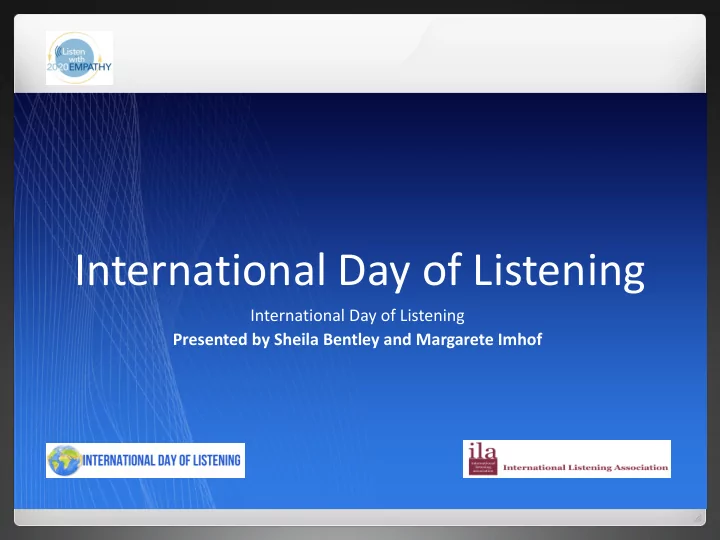

International Day of Listening International Day of Listening Presented by Sheila Bentley and Margarete Imhof
2 Empathy and Empathic Listening: Enhancing Our Ability to Connect with Others l A Mini Course presented bySheila Bentley & Margarete Imhof 22.06.20
Listening with empathy: A mini course 3 Date Presenters Topic May 28 Sheila Bentley Introduction and Overview of the Margarete Imhof June 18 Sheila Bentley How to identify emotions Margarete Imhof July 9 Jennie Grau Establish an Intent for Listening July 30 Graham Bodie Receive the Message and Listen with Empathy August 20 Lori Joubert & Krishna Respond with an appropriate empathic verbal and Naineni nonverbal message September 3 Sheila Bentley & Planning an activity for the International Day of Listening Margarete Imhof September 17 International Day of Listening: Listen with Empathy Activities You are invited to attend all sessions. Participation is free and voluntary donations are welcome.
Listening with empathy: A mini course 4 TODAY: How to identify emotions How do we recognize the emotions of the other? 1. How do we know that empathy is needed? 2. Pitfalls in and roadblocks to offering empathy 3. Our goals for today: Participants … … understand the process of emotions and emotion recognition. … identify factors which contribute to the assessment if empathy is needed. … identify factors which block and facilitate empathy. 22.06.20
The experience of emotions is a process 5 Example: Heart rate You enter a room and … increases Reaction of the body Knees knocking People turn Perception: Interpreting: away from Seeing, I am scared What does me after the hearing, this mean? first hello smelling … I introduce Responding The people Attributing myself with in the room Acting reservation don‘t like me 22.06.20
The experience of emotions is a process 6 Example: Heart rate You enter a room and … increases Reaction of the body Knees knocking I engage in a Perception: My system is Interpreting: series of Seeing, awake and What does friendly hearing, ready to go this mean? interactions smelling … I introduce myself in a I am curious Responding Attributing friendly and to see who Acting affirmative else is here manner 22.06.20
The experience of emotions is a process 7 The life cycle of an emotion may start Heart rate anywhere … increases Reaction of the body Knees knocking People turn Perception: Interpreting: away from Seeing, What does I am scared me after the hearing, this mean? smelling … first hello I introduce Responding The people Attributing myself with in the room Acting reservation don‘t like me 22.06.20
Recognize the emotions of others 8 22.06.20
How serious is the emotion expressed here? 9 On a scale from 1 to 10: What is the level of emotion that is being expressed here? How intense is the need to show empathy? 22.06.20
Identifying the need for empathy works in two ways 10 Higher order thinking skills top down Empathy bottom up Interpersonal Perception 22.06.20
Activity: Sheila‘s birthday 11 22.06.20
Objectives l Be able to identify emotions l Determine whether to listen with empathy l Determine whose needs or purpose will be met: l The speaker’s l The listener’s
Deciding Whether to Provide Empathy l Sometimes is automatic l Sometimes is a conscious decision l Sometimes complexity produces a cumulative effect
Complexity of an Emotion l External event l Sensory input l Your brain l Your body l Cognitive processes
Is Empathy Called For: The Tipping Point l What is the event or situation l Intensity of the emotion l Other cues (body language, voice, verbal) l The speaker’s need for empathy l Your ability to provide empathy
The Empathy Tipping Point 1 2 3 4 5 6 7 8 9 10 1-3 low need for empathy 4-5 probable need for empathy 6-8 high need for empathy 9-10 empathy required
Significance of Event and Sensory Input l External Event Death in the family Wedding Loss of job Birth Serious health problem Your birthday l Intensity of sensory input from five senses
Your Brain on Emotions l The limbic system plays a role in regulating emotion l Structures: l Thalamus: sensory relay station l Amygdala: aggression center l Hippocampus: converts short-term memory to long-term memory l Hypothalamus: triggers release of hormones
Complexity of Emotion: Your Body on Emotions l Bodily Systems l Autonomic l Sympathetic l Arousal—Fight or Flight l Parasympathetic l Brings levels down—Rest and Digest
Emotion: Sympathetic System l Fight or Flight Response l Heart: heart rate increases l Lungs: respiratory rate increases l Eyes: pupils dilate l Salivary glands: decrease in salivation (dry mouth) l Liver: more glucose produces energy l Adrenal glands: releases hormones—epinephrine (adrenaline) and norepinephrine l Digestive tract: decrease in digestion
Emotion: Parasympathetic System l Rest and Digest l Heart: heart rate slows l Lungs: respiratory rate slows l Eyes: constriction of pupils l Salivary glands: increase in salivation l Liver: glucose is stored l Adrenal glands: adrenaline decreases l Digestive tract: digestion increases
Activity: Assessing the Need for Empathy l In your breakout group, determine whose last name comes last in alphabetical order. That person will be the speaker. l Speaker: Talk about something that has happened to you during the Corona Virus Pandemic. It can be good or bad, significant or insignificant. Tell the group about your experience. l Listeners: Using the scale of 1-10 determine the speaker’s emotional intensity level. Share your number with the rest of the group. l Speaker: Share what number you would have given to your emotional intensity level. Discuss potential causes for any differences in the scores with the group. :
Listen with Empathy l Suggestion for your empathy journal: l Observe people in your environment and try to find out what emotions they are experiencing. Be mindful as to what the cues are that you are using and how you arrive at an interpretation of the kind of emotion they are experiencing and of the intensity. l Next session: July 9, 9:00 a.m. EDT l Jennie Grau: Listen with Intent
Recommend
More recommend